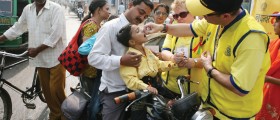
The world’s population has tripled in the 20th century and by this the use of renewable water resources has grown six times. It might be even hard to imagine, but more than one out of six people on our planet lacks access to safe drinking water. Expressed in numerals, that is around 1.1 billion people. Another 2.6 billion people lack adequate sanitation and approximately 3900 children die every day from various water borne diseases. In reality, these figures are probably much higher and the world population still continues to grow. We are expecting a drastic increase by another 40 to 50% in the next fifty years. As the humans occupy the planet, the urbanization will continue to exploit natural sources of water, which will eventually lead to serious consequences.
The water crisis
Water crisis is a term often used to describe the world’s water resources relative to human demand. The water crisis is recognized by world’s leading organizations such as the United Nations or the Food and Agriculture Organization. According to their prediction, humanity must take certain steps to avoid future shortage of the usable water and prevent the water pollution.
The Earth has a restricted supply of fresh water, stored in aquifers, surface waters and the atmosphere. The water crisis today mainly reflects in an inadequate access to safe drinking water, or water for sanitation and waste disposal. It is hard to believe but waterborne diseases are still the leading cause of death among the children under the age of five. This may not be obvious for someone living in the United States or in the rest of the developed world, but it is a cruel everyday fact for people in the undeveloped countries.
The excessive groundwater over-drafting is threatening to diminish agricultural yields. Moreover, the contamination and overuse of these limited water resources are destroying natural biodiversity.
The outlook
This serious issue is something that a modern society has to address very soon. As the population on the planet increases, it becomes more and more difficult to win the race for fresh water supply. The construction of wastewater treatment plants and reduction of groundwater over-drafting could solve the problem, but these solutions have some serious side effects, as they are very expensive to conduct and maintain. The reduction in groundwater over-drafting could, in addition, have a major economic impact on farmers.
Realistic approach would consider improved wastewater treatment or secure septic systems. People in developed countries could also help in this struggle by reducing their fresh water consumption and increasing the protection of ecosystems.

















Your thoughts on this
Loading...